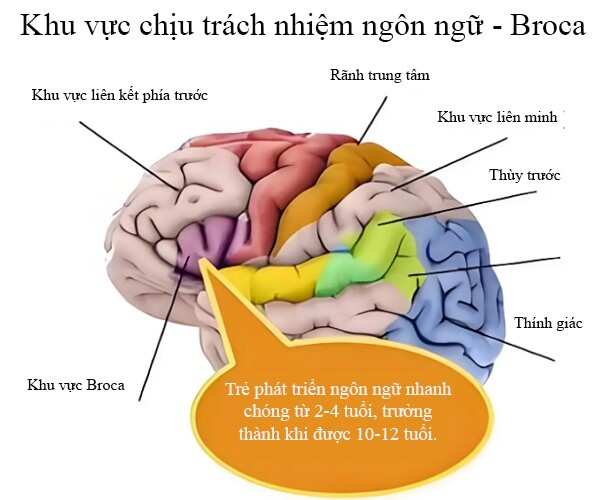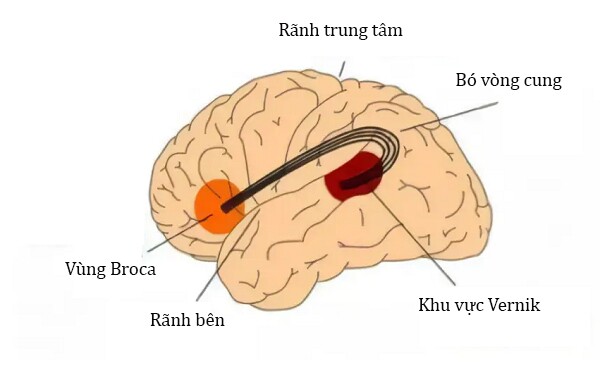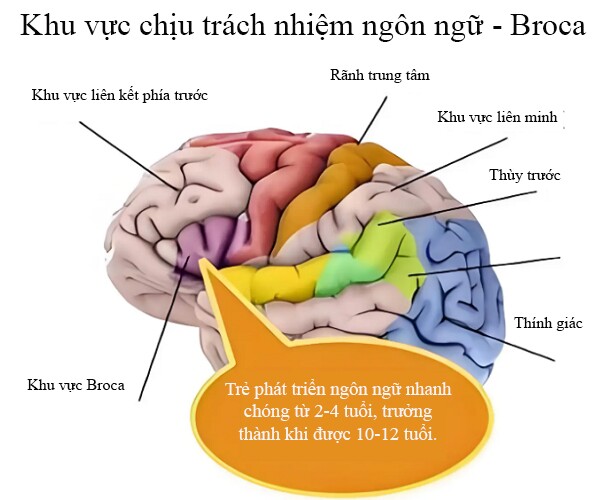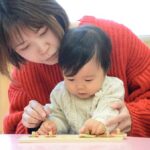According to research in “Child Developmental Psychology,” approximately 70%-80% of late talkers experience early language development delays. However, other brain functions, such as logical thinking and motor coordination, tend to improve during the same period.


Brain’s Language Function
Scientific studies on the brain have revealed that two regions play a crucial role in language development: Broca’s area and Wernicke’s area.
Located in the left frontal lobe, Broca’s area is the “backstage commander” of a child’s language expression. When a child has an idea they want to convey, Broca’s area quickly activates its powerful functions. It plans the content and structure of the language, carefully selecting each word and determining their arrangement and combination into sentences.
For instance, if a child wants to express the idea, “I want that toy,” Broca’s area instantly performs complex calculations and decisions to determine the word order (“I,” “want,” “that”) and form the corresponding grammatical rules for “toy.”
This area also precisely controls the speech organs, such as the mouth, tongue, and vocal cords, coordinating their movements.

Children with rapid and optimal development of Broca’s area tend to speak earlier and have a smoother start in their language expression journey.
On the other hand, Wernicke’s area, situated in the left temporal lobe, serves as the “intellectual center” for a child’s language comprehension. When a child hears external sounds, this area acts as a “translator,” accurately interpreting the sound signals into meaningful concepts that the child can understand.
For example, when a child hears the sentence, “Let’s go to the park together,” Wernicke’s area instantly conjures up images of the park, enjoyable playtime, and a warm atmosphere surrounded by family and friends.
Additionally, Wernicke’s area functions as a vast and organized vocabulary repository. Any new word a child learns as they grow up is stored in this area, along with its associated information.
When a child sees a red apple, Wernicke’s area not only remembers the word “apple” but also connects it with details such as its shape, color, taste, and the sensation of taking a bite. The next time the child hears the word “apple,” they can quickly retrieve the associated information from their memory bank.
Children with well-developed Wernicke’s areas tend to exhibit strong language comprehension skills. They can respond swiftly to others’ speech, demonstrating robust understanding and cognitive abilities.

Parental Conversations Stimulate Brain Development
As observed, Wernicke’s area serves as the “input” for a child’s language learning, responsible for understanding the content of heard language. In contrast, Broca’s area acts as the “output,” handling responses and expressions.
Early talkers tend to exhibit faster development in their brain’s language centers, particularly in establishing a stronger and more efficient connection between Broca’s and Wernicke’s areas. This enables them to express their needs and emotions using simple words and phrases at an earlier stage.
However, it is essential to note that late talking does not imply lower intelligence or weaker language abilities.

From the perspective of brain development structure, late talking can be attributed to the slower development of Broca’s area. Nonetheless, as children grow older, this area tends to improve in most cases, leading to enhanced language expression abilities.
Another significant factor contributing to late talking is an inadequate language environment, which often goes unnoticed by parents. In today’s busy world, many parents have less time to interact with their children.
Research has revealed that when a child does not receive sufficient language input and stimulation, the development of Broca’s and Wernicke’s areas may be relatively slow, inevitably limiting their language development.
Similar to a marathon, even if these children start a step behind in the language development race, they can quickly catch up with proper guidance and a conducive language environment.

How Can Parents Activate Their Child’s Language Area?
While late talking may not significantly impact brain development, parents naturally want their children’s progress to keep pace with their peers. The real concern arises when a child hasn’t started speaking by the age of two.
Is there a way to activate a child’s language system? In reality, parents can start by focusing on the following aspects, which will undoubtedly have a positive impact on brain development.
Engage in More Conversations: Use simple and clear language to describe daily activities and events. For instance, when bathing your child, you might say, “Let’s take a bath now, first washing your hair, and then your hands…” This descriptive approach helps children understand the connection between language and real-world objects and actions.

Repeat Words: Repeat a word several times to aid your child’s language retention. For example, when giving your child an apple, say the word “apple” repeatedly to help them become familiar with its pronunciation and meaning. Sufficient repetition will make it easier for your child to remember the word.
Respond to Your Child’s Expressions: Even if your child can only produce simple syllables, respond positively. For instance, if your child makes an “hmm” sound, you could say, “Do you have something to tell me?” Such responses encourage your child to try communicating more and enhance their desire to express themselves.
Minimize Electronic Distractions: Try to limit your child’s TV viewing or mobile phone usage. While electronic devices can provide some language input, they lack the emotional interaction and communication that are vital for language development. Excessive exposure to electronic devices can also lead to a lack of focus, impacting their learning and language comprehension.
Tell More Stories: Dedicate 10 minutes each day to telling a short story, exposing your child to diverse language expressions. During storytelling, your child encounters rich vocabulary, various sentence structures, and different language styles, enhancing their language comprehension and expression skills. Additionally, storytelling nurtures their imagination and thinking abilities.

Every child has their unique language development timeline. There is no “higher or lower IQ” distinction between early and late talkers; it’s merely a difference in brain region development. So, parents need not worry excessively.
If parents aim to enhance their child’s language skills, creating a language-rich environment is essential.








































